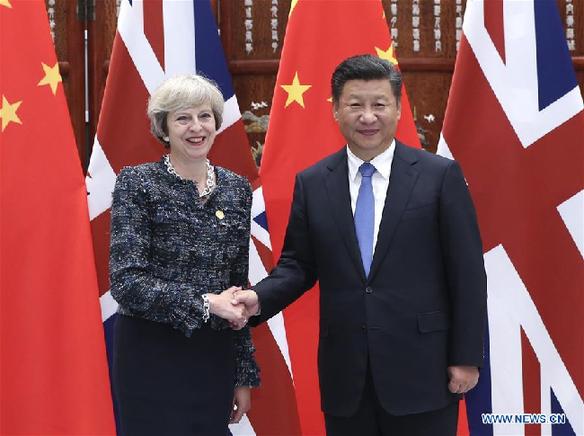China-UK agenda for prosperity and peace
china.org.cn / chinagate.cn by Liam Byrne, March 3, 2017 Adjust font size:
|
|
|
Chinese President Xi Jinping meets with British Prime Minister Theresa May in Hangzhou, capital of east China's Zhejiang Province, Sept. 5, 2016. (Xinhua/Pang Xinglei) |
Mrs May is coming to Beijing - and there's going to be plenty to talk about.
The British prime minister is heading to China to talk over how to take the "golden era" in China-U.K. relations to "new heights." Top of the list is the thorny question of how to get world trade back on track. Both countries need it. Despite China's booming consumer economy, a slowdown in world trade is bad for growth. And for the U.K. which has run a trade deficit for over a decade, new exports are vitally needed to stop our surging dependence on booming consumer credit.
But Britain will have to confront the new reality that today's global economic governance is part of the problem - not part of the solution. Not only do we need the U.K. and China to partner in taking on the new surge of protectionism, we need a joint plan for global institutions that are better equipped to accelerate global growth. That means keeping up the pressure for reform of the IMF and the World Bank - but crucially it means a bold new U.K.-China plan to accelerate the development of the New Silk Road vision, set out by President Xi in 2013.
With a more protectionist America, the New Silk Road could prove a vital new space where free trade can flourish. Today, that trade is held back by a lack of infrastructure, skills, and treaties. Few powers are as well-equipped as Britain and China to drive progress and what should emerge from the China-U.K. summit is a bold, inspiring declaration to transform the oldest trade route in the world into the biggest trade route of 21st century.
The idea has some deep roots on which to draw in Europe. Years ago, President Sarkozy of France proposed a grand new design for a Union of the Mediterranean to boost the old markets of northern Europe, and the old Roman Empire. But in the years that followed, the idea was lost. Now, we need the vision more than ever - not least because of the shifting geo-politics of the Middle East.
As the oil price stays low, countries around the Gulf are struggling with huge new budget deficits. For many Arab nations, the expensive social contracts put in place after the Arab Spring, require an oil price of around $85 a barrel. Yet those prices are unlikely to return any time soon, and without economic change, youth unemployment across the Arab world may hit 30 percent triggering new, widespread instability. Policy-makers in Britain know that the best defense against a fanatical Middle East, is a flourishing Middle East - and this is something a New Silk Road should help deliver.
It would be a mistake, however, for the president and prime minister to stick to foreign policy. Because it is trouble at home that is fuelling the rise of populism, nationalism and protectionism across the Western world.
Spiraling inequality, record immigration and the new threat from extremism are combining to create a new politics of fear, ruthlessly exploited by insurgent political parties. Many workers have not seen a pay rise - in real terms - since the turn of the century. Half the jobs created in Europe since the financial crash have been part-time or temporary, condemning millions to earn a livelihood which is at best uncertain.
The world's failure to find a solution to the crisis in Syria and Western failures in Libya mean that a million people landed on the shores of Europe last year, in the greatest movement of people since the Second World War. Meanwhile, ISIS has become the world's deadliest terror group, launching attacks every 84 hours.
Unless the world joins forces to offer new answers, there is a real fear that in Europe, this year's elections in Holland, France and Germany will only strengthen the hand of those who want to turn back the clock and build ever stronger borders.
The new dialogue on "inclusive growth" launched at the G20 in Hangzhou is one opportunity for the world to think anew - not about ending the market but mending the marketplace, so the wealth we are creating together is more fairly shared. But new economics requires a new politics of security and a new plan for the Middle East.
From the ashes of the last great global crisis in the 1930s, progressive thinkers in America, the U.K. and Europe invented a new kind of state designed to equip millions of our citizens with a security the marketplace could never offer. But it was cursed by our failure to stop the drift to war. Today, once again, we need to think anew about the state to offer security and opportunity in new times. And with it must come a new vision for peace in our time.
Liam Byrne is the Member of Parliament for Birmingham, Hodge Hill, Chair of the All-Party Parliamentary Group on Inclusive Growth, a member of the International Trade Committee and a proud supporter of the National Association of the Children of Alcoholics.
Opinion articles reflect the views of their authors, not necessarily those of China.org.cn.
